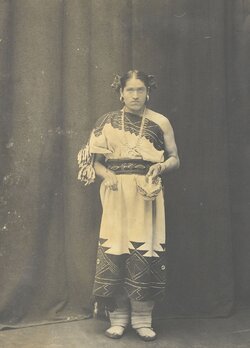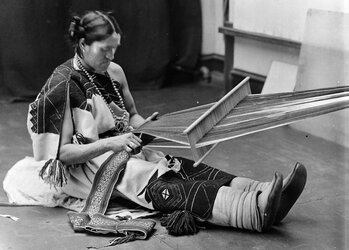There were no queer Indians in this mythical third role. The “two spirit” concept comes from the 1970s, it has no basis in reality. Effeminate faggots were treated as outsiders who got tribal protection in exchange for being their deviant sex toy. But they never considered them women, they were just faggots.
Eh, that's kind of what they mean by a third gender role. For example, the Pueblo Zuni had something called "Lhamana", the most famous of whom was We'wha.


The Pueblo Zuni were a matrilineal culture (husbands would move in with a wife's family) and had a creation myth where basically they're trying to find the Zuni valley to live in. The children of a rain priest, a brother and sister, are selected to be their temporary leaders but that night the brother rapes the sister and conceives 10 children, 9 of whom were infertile and became koyemshi clowns, but one of whom was a hermaphrodite called Kolhamana. Sister gets pissed and makes a magic river that turns all the Zuni children into frogs who can swim to Zuni heaven (Sacred Lake) and some other stuff happens, but long story short the clowns eventually attack a neighbouring village and a giant warrior woman captures them - and Kolhamana is such a nightmare that she dresses him in women's clothes to try and calm him down. This is where their belief about Lhamana came from, because their whole thing was finding balance and "the middle" (which is where they thought their homeland should be).
Boys who were effeminate and preferred doing women's work were encouraged to dress in female clothing, but when they started puberty they were told they either had to become men and do the male initiation ritual, or instead become Lhamana - they had to decide, and whatever they picked was what they'd be from then on. If they went with Lhamana, then they would be required to wear women's clothing at all times and were largely expected to do women's work like weaving (but not participate in communal child rearing), but were also allowed to do some men's work. Lhamana were often seen as auspicious because they had the strength of men while doing women's work, and unlike the women they wouldn't get made to take breaks during menstruation or pregnancy so could keep on working. They were generally the receptive partners to men (either men who wanted a bit of strange when their wife was pregnant/menstruating, but sometimes they would form relationships and live as man-and-lhamana) but it was not permitted for them to partner up with other lhamana.
Only men who had done the male initiation ritual were allowed to participate in the ritual kachina dances (rain dance and the like), where the dancers are sort of seen to become the spirits they embody - so men perform all the roles, including that of the women kachinas. The exception is the role of Kolhamana, which was generally only performed by a lhamana (even though they were otherwise never allowed to participate in the kachina dances).
This is just one example in one tribe and it varied massively, but at least as far as the Zuni were concerned, a Lhamana was definitely not a woman but also not a man either. You can say this was just them saying "effeminate faggots" weren't proper men and so they were forced to live differently, but three sets of codified gender roles (this is how a man behaves, this is how a woman behaves, this is how a man who's an effeminate faggot behaves) is essentially what sociologists mean by third gender. Which is why it's so funny when third genders get brought up, because sideshows would HATE to live in a third gender society.
"I'm a butch lesbian domme" - no you're not, you have to wear the women's clothing and submit to men. "I'm a transbian" - no you're not, relationships between lhamana are not permitted. "I want to go hunting" - that's only for men, you're not a man, go back to basket weaving. "I want to play with the kids" - that's only for women, you're not a woman, go back to basket weaving. "I'll play sport with the girls" - you can't, you have man strength. "I've got period cramps" - our culture very specifically makes note of the fact you cannot menstruate because you are not a woman. "Now my wife's pregnant, my egg just cracked!" - you already did the male initiation ritual, you cannot become a lhamana now. You get the picture. No culture that had third genders encouraged people to self define as they saw fit or would have affirmed a trans person as being their desired gender (they'd have insisted they were a third gender).






















